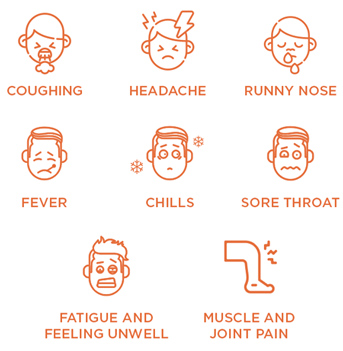4

WHAT IS FLU?
Flu is a contagious respiratory illness caused by influenza viruses that infect the nose, throat, and sometimes the lungs. It can cause mild to severe illness, and at times can lead to death.2
HOW DOES THE FLU VIRUS SPREAD?
Seasonal influenza spreads easily, with rapid transmission in crowded areas including schools, nursing home and the workplace. When an infected person coughs or sneezes, droplets containing viruses (infectious droplets) are dispersed into the air and can spread up to one meter, and infect persons in close proximity who breathe these droplets in. The virus can also be spread by hands contaminated with influenza viruses.3
WHAT ARE THE SYMPTOMS OF FLU?
People who are sick with flu often feel some or all of these symptoms:3

HOW CAN FLU BE PREVENTED?
Avoid close contact with people who are sick.
When you are sick, keep your distance from others to protect them from getting sick too.4
Stay home when you are sick.
If possible, stay home from work, school, and errands when you are sick. This will help prevent spreading your illness to others.4
Cover your mouth and nose.
Cover your mouth and nose when coughing or sneezing.4
Clean your hands
Washing your hands properly will help protect you from germs.4
Avoid touching your eyes, nose or mouth.
Germs are often spread when a person touches something that is contaminated with germs and then touches his or her eyes, nose, or mouth.4
Practice other good health habits.
Clean and disinfect frequently touched surfaces at home, work or school, especially when someone is ill. Get plenty of sleep, be physically active, manage your stress, drink plenty of fluids, and eat nutritious food.4
Get Vaccinated
One of the best ways to prevent seasonal flu is to get vaccinated each year.4
Learn more about flu from Dr. Kris

Share information about influenza prevention to your family and friends. Download our online leaflet here.
Ask your doctor about flu prevention including vaccination today.
References:
- WHO. Vaccines against influenza. WHO position paper – November 2012. Weekly Epidemiol Rec 2012: 47: 461-476
- US CDC. Key facts about influenza. 2019. Available at https://www.cdc.gov/flu/keyfacts.htm. Last assessed May 2019.
- WHO. Fact sheet influenza (seasonal). 2019. Available at: http://www.who.int/en/news-room/fact-sheets/detail/influenza-(seasonal). Last accessed May 2019.
- Healthy habits to help prevent flu. Available at: https://www.cdc.gov/flu/prevent/actions-prevent-flu.htm . Last accessed May 2019.
- US CDC. Prevention and control of seasonal influenza with vaccines. Recommendations of the advisory committee on immunization practices – United States, 2017–2018. MMWR Recomm Rep. 2016;65: 1–54. Available at: https://www.cdc.gov/mmwr/volumes/65/rr/pdfs/rr6505.pdf Last accessed January 2019.
- US CDC. Key Facts About Seasonal Flu Vaccine. 2018. Available at: https://www.cdc.gov/flu/prevent/keyfacts.htm Last accessed January 2019.





